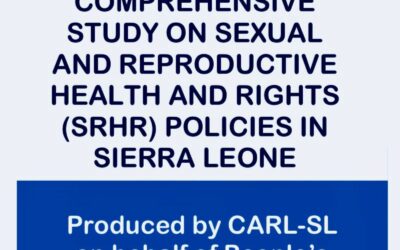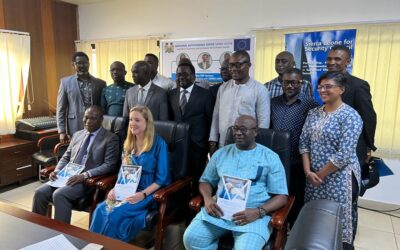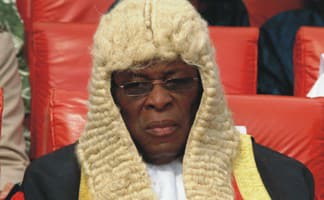The Centre for Accountability and Rule of Law (CARL) has launched a study report entitled, “A Review of the Administration of Electoral Justice in Sierra Leone: Challenges and Opportunities for Reforms”. Funded by the Irish Embassy, the study report provides an assessment of the legal and structural environment for effective administration of electoral justice.
Sierra Leone will organise muti-tier elections in 2023, the fifth round of elections since the country’s 11-year civil war ended in 2002. Whilst all the post-conflict elections conducted in Sierra Leone were declared to be largely free, fair, and credible, resolving election-related disputes or complaints in an expeditious and satisfactory manner remains a major challenge. Electoral justice is critical to promoting and consolidating democracy. It safeguards both the legality of the electoral process and the political rights of citizens.
The broad objective of this study is to provide an assessment of the legal and structural environment for the effective administration of electoral justice. It also seeks to assess the capacity of existing electoral dispute resolution mechanisms and make recommendations for reforms that may expand the opportunities for resolving electoral disputes. It is ultimately geared towards supporting an effective electoral justice mechanism in Sierra Leone. Our objective is to help build and strengthen an electoral justice system that resolves election-related complaints through different legal mechanisms, guaranteeing full compliance with the law, and to help democracy in Sierra Leone thrive.
As part of this study, we have identified the common sources or causes of electoral complaints, and discussed how the inadequacies in electoral justice mechanisms undermine access to justice and its impact for peaceful and transparent electoral processes. We have also identified ongoing efforts to respond to the challenges that undermined efforts to access electoral justice in the last three electoral cycles, the persisting challenges that need to be overcome, and have made recommendations for reforms. We note, for example, that in the 2012 and 2018 electoral cycles, the key election[1]related grievances were as follows: controversies regarding the accuracy of the 2015 census data and delimitation of boundaries; objections to the legitimacy of parliamentary and presidential candidates; disagreement over the procedures for counting ballots and transmission of results; election-related violence and petitions relating to the validity of election results; the improper use of state resources and undue manipulation of state institutions. The study found that resolving election[1]related disputes through the Sierra Leonean courts has been anything but seamless.
Apart from delays that characterise the proceedings, the laws do not always foster effective and satisfactory resolution of such disputes. After the 2018 general elections, for example, at least 68 petitions challenging the election of Members of Parliament and the President were filed with the courts. Consequently, the High Court invalidated the elections of nine Members of Parliament representing the main opposition, All People’s Congress (APC), on the grounds that they were unduly or improperly elected. The Court ordered that the nine MPs be replaced with the candidates representing the ruling Sierra Leone People’s Party, who had polled the second highest number of votes. This was clearly unsatisfactory to the opposition APC, and many commentators have partly attributed the heightened tension in the country and the violence that has characterised the post-2018 bye-elections to those decisions.
We note that the laws of Sierra Leone require primarily the High Court and Supreme Court to resolve petitions relating to the eligibility of candidates and the validity of results. Even though the laws make provision for the establishment of Electoral Offences Court to try elections-related offences, including violence, we note that the police and the courts have not been effective in delivering their mandate of ensuring accountability and justice for electoral offices. Ahead of the 2018 elections, for example, the Electoral Commission discovered 1,539 cases of duplicate registrations, and despite strong efforts by the Commission and civil society, hardly anyone was punished for such clear violations of the law. Similarly, in 2020, the police failed to investigate and prosecute a man who forcefully picked up and destroyed a ballot box in the full view of the public. In addition, the Supreme Court has not done enough on the substantive electoral complaints filed with the Court on their merit as the Court’s decisions have largely been based on technical matters. In addition, investigation and prosecution of electoral offences have been largely slow, selective, and inconclusive.
Given the challenges that confront the conventional electoral disputes resolution mechanisms, we propose that it is worth thinking about alternative ways of resolving electoral disputes/ challenges. Whilst the formal systems, especially if they are well-funded and operate professionally, are useful in that regard, they ought to be complemented by other means and mechanisms. Such informal or alternative electoral dispute resolution (AEDR) mechanisms need to exist in Sierra Leone primarily not to replace formal dispute resolute systems but to play a supportive role, especially in situations in which the formal systems face credibility, financial or time constraints linked to political or institutional crises or to their inadequate design. The AEDR mechanisms, we recommend, should exist alongside formal mechanisms such as the court, Electoral Commission of Sierra Leone (ECSL), and the Political Parties Registration Commission (PPRC), and must play a permanent supportive and complementary role. We acknowledge that some AEDR mechanisms have come into being over the last decade on an ad hoc basis and in exceptional or extraordinary circumstances, but it is important that we explore the possibility of institutionalizing their role across the full spectrum of the electoral process. We point out that there has been some progress in the last five years in implementing recommendations by international and local election observers, especially those relating to electoral law and institutional reforms, but significant challenges remain in terms of negative public perception about electoral justice mechanism, lack of clarity in electoral laws, funding gaps and weak institutional capacity. We conclude by recommending, among other things, legal reforms to ensure clarity and speed in handling of election-related petitions particularly for presidential elections; the development of and strengthening the capacity of alternative electoral dispute resolution institutions; improvement in the capacity of election management bodies to minimize the chances of electoral challenges, and the need to undertake extensive public education about the opportunities for addressing election-related complaints.
Crucially, we hope that these recommendations will be implemented in time for the next election. Please read the full text of the report here



